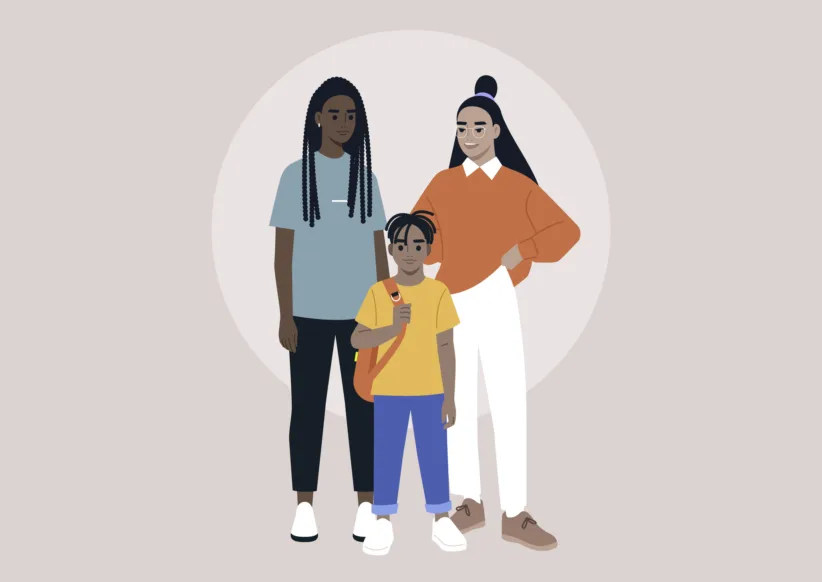When a couple is planning for a new baby, emotions tend to run high. Joy, elation, and anxiety are just a few of the feelings that expectant parents experience before bringing a new life into the world. If the baby has been diagnosed with Down syndrome, however, the emotional reaction on the part of the parents can be doubly amplified. Once the baby is born, his special needs — emotional, mental, physical, and nutritional — are often overwhelming. And when doctors, close friends, and even family members don’t know what to say and can’t understand, parents may feel they have nowhere to turn. For families residing in Nassau or Suffolk counties, there is a group that understands and supports them: the Down Syndrome Connection of Long Island. This not-for-profit organization based in Huntington seeks to inform and empower local parents of children with Down syndrome. It also reinforces the belief that the birth of any child is a blessing.
Maria Cordes, the founder of DSCLI, recalls vividly how she was treated after her now five-year-old son, Jake, was born. While she says her doctors were “great,” and that they never treated her in a negative manner, still “they had no information to provide” her. “No one ever offered me information, literature, not even so much as a pamphlet,” she remembers. And once she brought Jake home, she began feeling isolated, in addition to overwhelmed. “The thing is,” explains Cordes, “a lot of specialists come to your house to work with your children (when they’re first born), and…because (the specialists are) working in your home, you’re not leaving the house, and you (so) don’t get to interact with anybody.”
It was during this time that Cordes confessed her feelings of isolation and frustration to her son’s physical therapist. The therapist confirmed many of the parents she worked with were all saying the same thing: when they had their children, they left the hospital with nothing to go on, and now felt very alone. The therapist then suggested that Cordes and some of the other parents meet to talk and exchange advice. “(Y)ou all wind up using the same therapist, and because we were all telling her of how…we felt at the time, she suggested we…exchange phone numbers and start talking.” Parents who understood the unique joys and challenges of having kids with Down syndrome began to gather at a local restaurant. That was in the winter of 2007. After a few casual meetings, the parents realized how much other families like theirs could benefit from the formal establishment of their organization. They even went to the trouble of getting their group legally recognized. “We went the whole nine yards with getting the paperwork processed, [hiring] a lawyer, and getting tax IDs to establish ourselves as a non-profit,” explains Cordes. “There are other formalized organizations on Long Island, but they offer different things than we do.”
One of the main things DSCLI offers is support to parents whose babies — whether newly born or not yet delivered — have just received a diagnosis of Down syndrome. “[We want] to bring the human side of the diagnosis to the patients,” says Cordes. “We have created two binders, one to be provided to the patient and the other for the health care provider, so they can better understand what the patient may be feeling.” And with the First Call program, members of DSCLI make themselves readily available to talk – which they make known through the parents’ health care providers. “We have the nurses (at local hospitals)…ask parents of a baby with Down syndrome if they’d like someone, who knows what they’re going through, to meet with them (to talk),” explains Cordes. “When we do meet, we just let them know of information gathered from national organizations. This information can range from topics such as early intervention, available services, (and) community groups. We also give them special growth charts created for kids with Down syndrome, so they can observe their children’s progress. And most importantly…new parents (can) speak freely about their feelings and experiences with others that understand their situation.” The purpose of DSCLI is not to tell any parent the “right” way to feel or make decisions. “We don’t tell people what doctors to see or what choices to make,” confirms Cordes. “We just give them information, so that at least they have it.”
DSCLI organizes and hosts informational meetings for parents, during which experts are invited to speak about topics relating to Down syndrome. For example, DSCLI “invite(s)…doctors who work with children with Down syndrome…to come speak to parents about different things they can expect to see in their child’s development,” says Cordes. “We’ve had endocrinologists, feeding specialists, physical therapists, cardiologists. We’ve had people talk about Celiac disease.” DSCLI has also hosted congressmen and lawyers who handle cases involving children with special needs. Cordes says these meetings are often the most rewarding aspect of DSCLI. “When we have doctors come speak, the parents thank us. They say, ‘This is information I wouldn’t have gotten otherwise.’ They’re glad to know there are other families out there like theirs.” Denise Supon of East Elmhurst, Queens, is one of those grateful parents: “I highly recommend (DSCLI) to parents…to help them obtain the information they need to assist their child to reach their highest level of function.”
DSCLI also seeks to unify parents of children with Down syndrome in less serious settings. They host family-friendly social activities throughout the year, such as a holiday gathering every December at Meehan’s Irish restaurant in Huntington, as well as an annual bowling party in Syosset. In the summertime, there’s always a get-together at a local park or nearby beach. And DSCLI frequently organizes a “moms’ night out” at local restaurants. There are no dues, fees, or charges for these, or for any other services or events DSCLI plans. “There are no dues,” confirms Cordes. “All we do is organize it. We just get together.”
Cordes says one of the best things about being a part of DSCLI is meeting new parents, which typically begins with the members of DSCLI giving them a gift on the occasion of the birth of their child. “The gift we send new parents usually consists of a blanket and a book and a card,” says Cordes. “We keep it extra positive. We’re very much on the positive side. We try to let them know, ‘if you want to talk, we’re here.’”
For more information about Down Syndrome Connection of Long Island, please visit www.dscli.org.





















